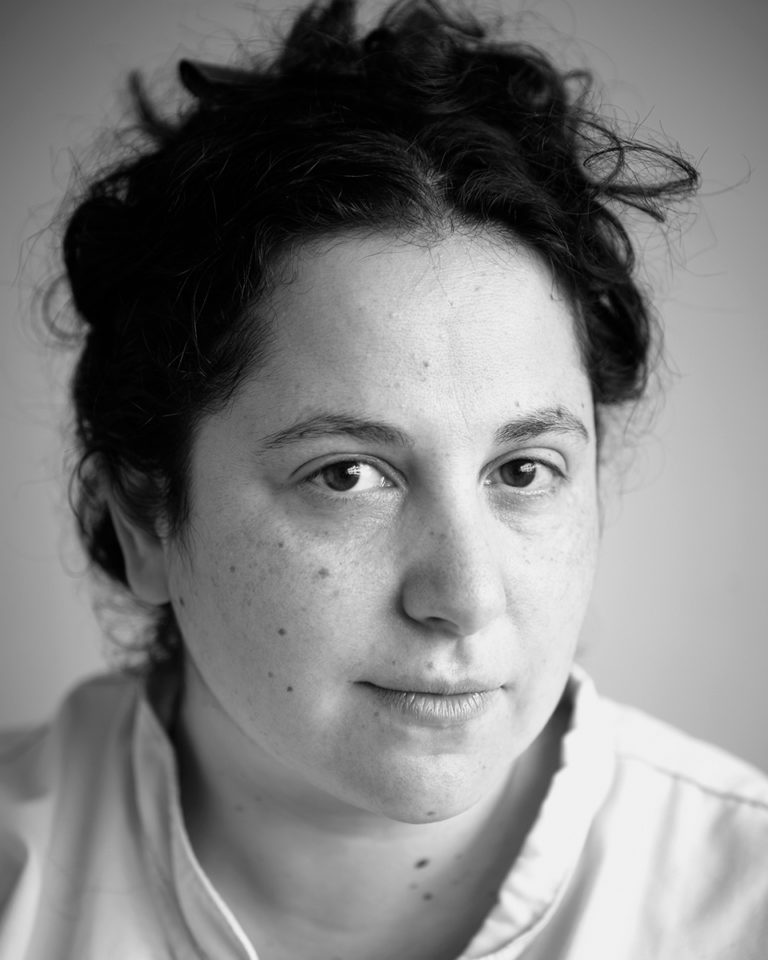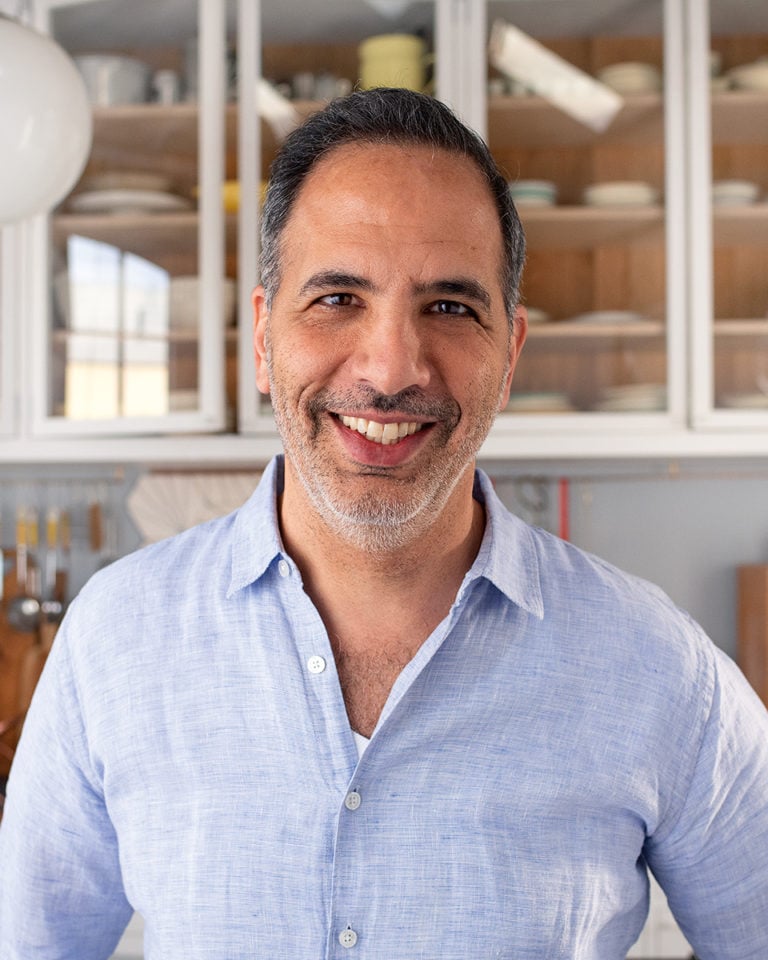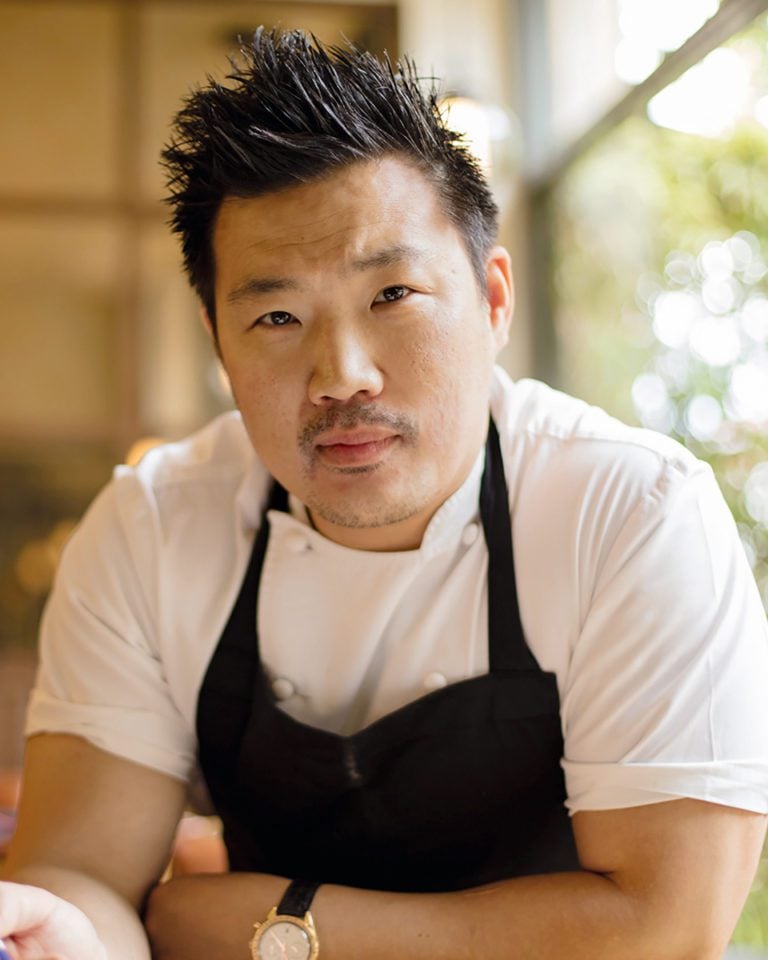Diana Henry meets…Sarit Packer
The food at Honey & Co is so enticing that the London restaurant was an immediate success, but it hasn’t all been easy. Co-founder Sarit looks back on ‘mistakes’ and talks frankly to Diana Henry about never quite feeling she belongs, yet the fun and passion she puts into her work shine through – and people love her for it…

Sarit Packer makes me think of fruit. Sitting opposite her I want to eat ripe watermelons and juicy tomatoes, the sort of ingredients – vibrant, almost alive – that she loves. Half of the duo who are affectionately known in the London food world as ‘the Honeys’, Sarit – together with her husband Itamar Srulovich – opened a tiny restaurant that went on to be very big.
Honey & Co, just off Tottenham Court Road, opened 10 years ago. The place was kitted out with what looked to be garden furniture (at least I always wobbled a bit on the slatted chairs) and Sarit and Itamar cooked Middle Eastern ‘home’ food that was simple and intensely flavoured. Syrup-drenched pastries and spice-scented breads were always on display, seducing passers by. Inside, it felt like eating in the kitchen of friends; there was such a sense of affability, casualness and greedy anticipation. Some dishes, like the honey, feta and kadaif cheesecake, had a cult following.
Everyone wanted a table at Honey & Co
Sarit and Itamar hadn’t thought about who would come to this new restaurant but the location, with a hospital, publishing houses and the BBC nearby, turned out to be a massive plus. News travelled fast – everyone wanted a table at Honey & Co. and in just three months they’d made it.
A publishing deal that was the talk of the town quickly followed. The restaurant became known as much for the personalities of the owners as for the food. Itamar was the noisy one, jovially doing front of house, remembering customers’ names, cracking jokes. While I’m chatting with Sarit in Honey & Smoke, their second restaurant, he keeps interrupting. “Are you at the bit about me now?” he quips, buttering me up with a slice of Sarit’s cake. “Yes, and it’s bad,” I say. He just laughs.
"Sitting opposite Sarit, I want to eat ripe watermelons and juicy tomatoes, the sort of vibrant ingredients that she loves." — Diana
A ‘Jewish-English’ childhood
Sarit was born in Israel, though her parents are from here. She talks about being brought up in a ‘Jewish-English’ home. “My mum cooked very English food – pies and soups – and we had Worcestershire sauce and Marmite in the cupboard, but sometimes Jewish food too (Mum salted her own beef). We
didn’t speak Hebrew at home, though. I didn’t learn that until I went to school.” Sarit liked cooking from a young age and, by her teens, was catering for events.
She wouldn’t go to university – despite her parents’ hopes – but left for London and trained at the Butler’s Wharf Chef School, part of the Conran empire. “It was the 1980s, the era of Conran restaurants, and I loved that you learnt on the job,” she says.
Once you were ‘in the system’ you could trial for any Conran restaurant and Sarit landed a job at The Orrery – high end and elegant – in Marylebone. “It was amazing,” she says, eyes shining. “Proper fine dining, 16-hour shifts, really pressurised, mental. And I loved it. I knew exactly what I was doing and I like high adrenaline.” After two years, though, she was exhausted and, when various flats fell through, she thought it was time to go home.
Falling in love
Back in Israel, Sarit met Itamar while they were both working in the same restaurant. “Love at first sight!” I exclaim. She wrinkles her nose. “I thought he was a bit of a waster,” she says. “He wasn’t focused and he was always late.” They became friends, though, and after a particularly tough service – it was 40°C in the kitchen – they went to a nearby beach for a swim. “And that was it,” Sarit smiles. “I fell in love over a long period. Itamar asked me to marry him a few times, but I didn’t want to marry anyone – I just wasn’t into marriage. Then we both wanted to go back to London and Itamar needed a visa so we did the deed.”
"I don’t want to be ‘out there’. I like being quiet and cooking. I’m quite English — though I feel a bit of an outsider here. When I’m in Israel I feel I’m from there, but also a bit of an outsider." — Sarit
Running a kitchen
After stints in brasseries, they both got jobs at Ottolenghi. Itamar cooked and Sarit oversaw the pastry teams across all the Ottolenghi restaurants. Female chefs are often praised for being nurturing. I wonder if that helped her. “I don’t think female chefs are more nurturing,” she says. “I’m very strict. In fact, when issues came up between specific chefs, I learnt to stop trying to fix them. They’re adults, they have to sort things out themselves. But I’m organised and I get a lot of respect for that.” She moved on within the company, launching Nopi, and learnt about the practicalities of creating somewhere new. “Restaurants aren’t just about food, they’re about bin contracts and extraction fans and builders.”
Sarit eventually missed cooking in the kitchen and that’s when she and Itamar opened their own place. Now they have Honey and Co – about to move to new premises in Bloomsbury – a deli, a grill restaurant (Honey & Smoke), a column in the Financial Times and an award-winning podcast, The Food Sessions.
“Despite what we learnt at Ottolenghi, we were naïve when we started Honey and Co. We opened without a single recipe. Every day we just cooked what we wanted and gradually took on more chefs.” Sarit is sorry they didn’t credit their time at Ottolenghi. “We made a decision not to ride on Yotam’s coat tails, so we never talked about Ottolenghi, but I can now see that it looked as if we were disowning it. That wasn’t what we meant at all.”
Opening Honey & Smoke five years later was harder. Sarit slumps in her chair. “First there was the size. We were shocked by the scale of it – 100 covers a night – even though we’d planned it. We got the décor wrong too – we had bright blue walls and white plastic chairs and customers complained about it. We had to have a rethink. The whole thing was the result of vanity and stupidity.” It was also hard on Sarit and Itamar’s relationship. At Honey & Co, they were in the kitchen at different times. “At Honey & Smoke we were both together in a kitchen for the first time in years and it was horrible. We were more focused on managing each other than doing what we should have been doing. I’d say that was the worst six months of our lives.”
“Honey & Co felt like eating in the kitchen of friends; there was such a sense of affability, casualness and greedy anticipation.” — Diana
Looking to the future
They had just managed to pull things round when Covid struck, the restaurants had to close and they both got ill. “There are thousands of pounds of goods in a restaurant – it’s terrible to look at that kind of loss.”
Now everything is back to some kind of normal and they’ve had much-needed trips to Greece and Israel. “We’ve always cooked at home and if a dish was good we would put it on the menu. But I had started to get bored with my own food. I needed inspiration.”
I wonder, now the dust has settled, if she and Itamar really had a protracted power struggle. “Neither of us is more in charge than the other,” she says simply. “We have very different qualities and character traits. Itamar is all about vision. He knows where we’re going. He kept me buoyant during Covid. If it had been up to me, I’d have stayed in bed for six months. I am more focused on details, practicalities, the day-to-day stuff and I don’t want to be ‘out there’. I like being quiet and cooking. I’m quite English – though I feel a bit of an outsider here. When I’m in Israel I feel I’m from there, but also a bit of an outsider. People are very straightforward in Israel, they say it how it is, and it has great energy.” A strong woman, then, who is the product of both her backgrounds.
I’m amazed she keeps going, given all she has to juggle. Sarit hasn’t mentioned fun – it’s all that focus – but she laughs and says, “Oh we’ll try anything for fun – podcasts, TV, demonstrations! But the restaurants are the core. I love that restaurants are the places people come to for birthdays and anniversaries. You’re part of someone’s world.”
In 10 years she’d like to be spending six months with Itamar in a Greek village – they adore Greece – and six months in London. “Come to the Peloponnese, Diana. You’d love it. You should see the fruit!” I’ve been thinking about fruit for the last two hours. She won’t have to ask me twice.
Subscribe to our magazine
Food stories, skills and tested recipes, straight to your door... Enjoy 5 issues for just £5 with our special introductory offer.
Subscribe
Unleash your inner chef
Looking for inspiration? Receive the latest recipes with our newsletter


